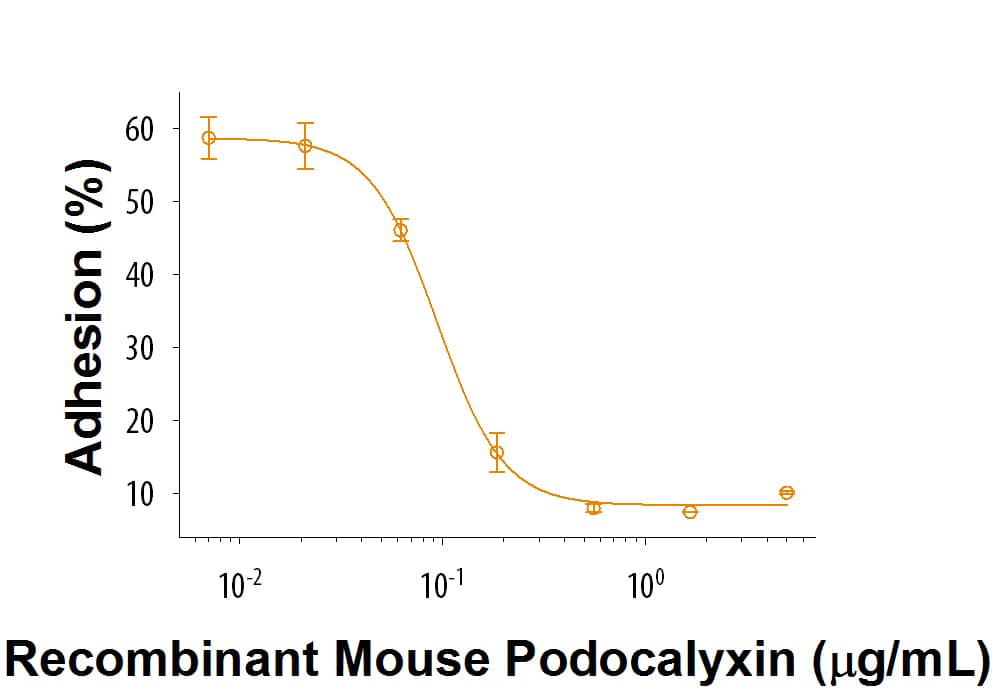Recombinant Mouse Podocalyxin Protein, CF
R&D Systems, part of Bio-Techne | Catalog # 1556-PD

Key Product Details
Product Specifications
Source
Mouse myeloma cell line, NS0-derived mouse Podocalyxin protein
His22-Arg402, with a C-terminal Asp and 10-His tag
His22-Arg402, with a C-terminal Asp and 10-His tag
Purity
>95%, by SDS-PAGE with silver staining.
Endotoxin Level
<0.10 EU per 1 μg of the protein by the LAL method.
N-terminal Sequence Analysis
His22
Predicted Molecular Mass
41 kDa (monomer)
SDS-PAGE
110-170 kDa, reducing conditions
Activity
Measured by the ability of the immobilized protein to inhibit the adhesion of CHO Chinese hamster ovary cells transfected with P-Selectin.
The ED50 for this effect is 0.07-0.35 μg/mL.
The ED50 for this effect is 0.07-0.35 μg/mL.
Scientific Data Images for Recombinant Mouse Podocalyxin Protein, CF
Recombinant Mouse Podocalyxin Protein Bioactivity
Recombinant Mouse Podocalyxin (Catalog # 1556-PD) inhibits the adhesion of P-Selectin transfected CHO Chinese hamster ovary cells. The ED50 for this effect is 0.07-0.35 μg/mL.Formulation, Preparation and Storage
1556-PD
| Formulation | Lyophilized from a 0.2 μm filtered solution in PBS. |
| Reconstitution |
Reconstitute at 100 μg/mL in sterile PBS.
|
| Shipping | The product is shipped at ambient temperature. Upon receipt, store it immediately at the temperature recommended below. |
| Stability & Storage | Use a manual defrost freezer and avoid repeated freeze-thaw cycles.
|
Background: Podocalyxin
References
- Nielsen, J.S. and K.M. McNagny (2009) J. Am. Soc. Nephrol. 20:1669.
- Li, J. et al. (2001) DNA Seq. 12:407.
- Kershaw, D.B. et al. (1997) J. Biol. Chem. 272:15708.
- Sassetti, C. et al. (1998) J. Exp. Med. 187:1965.
- Vitureira, N. et al. (2010) PLoS ONE 8:e12003.
- Zhang, H. et al. (2014) Stem Cells 32:191.
- Doyonnas, R. et al. (2005) Blood 105:4170.
- Lee, R-H. et al. (2009) Blood 113:816.
- Moscoso, I. et al. (2013) J. Tissue Eng. Regen. Med. Epub. PMID 23897803.
- Dallas, M.R. et al. (2012) Am. J. Physiol. Cell Physiol. 303:C616.
- Thomas, S.N. et al. (2009) Am. J. Cell Physiol. 296:C505.
- Binder, Z.A. et al. (2013) PLoS ONE 8:e75945.
- Wang, Y. et al. (2012) Am. J. Physiol. Renal Physiol. 302:F1084.
- Alonso-Martin, S. et al. (2010) Thromb. Res. 125:e300.
- Schopperle, W.M. and W.C. DeWolf (2007) Stem Cells 25:723.
Alternate Names
GCTM, PCLP, POD XL, PODXL
Gene Symbol
PODXL
UniProt
Additional Podocalyxin Products
Product Documents for Recombinant Mouse Podocalyxin Protein, CF
Product Specific Notices for Recombinant Mouse Podocalyxin Protein, CF
For research use only
